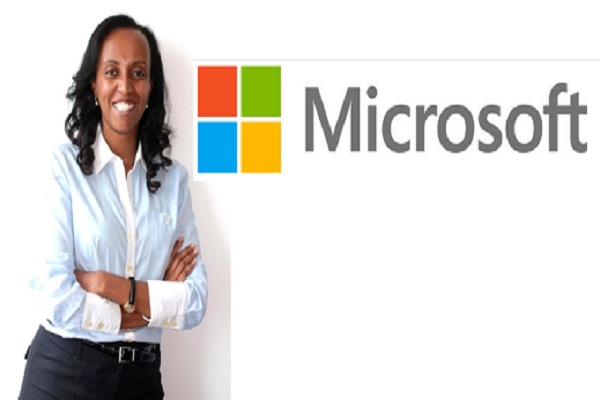General News
Microsoft: Getting behind AI growth in Africa

By Amrote Abdella, Regional Director, Microsoft 4Afrika,
The impact of artificial intelligence (AI) dominated discussions at this year’s World Economic Forum in Davos–with delegates touching on everything from ethics to democratization and workforce re-skilling.
While AI is primed to be the driving force of the Fourth Industrial Revolution, its widespread acceptance and adoption among businesses is still in early stages. The year 2018 was an important onein shifting current perceptions around AI, demonstrating it as atechnology that is here to augment human capabilities, not replace them, and to benefit the speed and scale of any organization, large or small.
These conversations have carried weight. In just four years, the number of global organizations deploying AI has increased by 270 percent.
In Africa, the momentum is similar,and continues to grow asaccess to high quality broadbandand cloud computing improves.Organizations are recognizingAI’s ability to help with some of the continent’s most pervasive problems, from reducing poverty to improving healthcare and enhancing crop yields to feed a growing population.
Microsoft, through initiatives such as 4Afrika, has its sights set on making AI available to everyone on the continent, in line with our global mission to empower every person and organization on the planet to achieve more. We are partnering with forward-thinking policy makers, innovative startups, technology partners, civil society groups and stakeholders to promote the growth of a vibrant AI ecosystem in Africa – one that enables inclusive growth and providesa clear and trusted path to digital transformation.
Promoting innovation with AI
Many of our local partners, including SMEs and startups, have already begun their AI journeys. Nigerian startup, MyMusic, has experimented with chatbots to help users discover new local music.And fintech startup, MoVAS Group, who we first met in 2016, is now building AI into their credit-scoring algorithms, enabling more unbanked farmers and small business owners to access loans the first time.
In the finance industry, 66 percent of the population in sub-Saharan Africa is listed as unbanked. The proliferation of mobile banking across the continent has increased financial inclusion, andAI powered intelligent applications are now taking this further. AI can capture and crunchlarge volumes of non-traditional data, such as mobile wallet transactions, thatenable service providers to make automated loan decisions to new customers, with no previous financial track records,in seconds.
Across the Middle East and Africa, a projected $28.3 million will be spent on developing AI solutions in the financial sector – and organisations are ramping up efforts to ensure young developers are well equipped for the task. At the recent AI Bootcamp, hosted by Data Science Nigeria andsponsored by Microsoft, for example, local developers were upskilled in using deep learning concepts to drive financial inclusion.
Developing this kind of AI capacity in Africa is essential, not only to ensure our 200 million-strong youth population is equipped for jobs of the future, but also toensurelocal AI systems themselves are unbiased and inclusive.
Developing the right skills and data sets
Without the skills to build homegrown applications, organizations are likely to import machine-learning algorithms developed elsewhere, which are trained on biased data sets that lack local context. This could have severe consequences in industries like healthcare.
What Africa needs is a richer pool of local data, coupled with AI applications that are built by skilled local teams with diverse demographic, gender, ethnic and socio-economic backgrounds. To achieve this, outdated processes need to be digitised, education systems need to adapt quickly, and digital literacy programmes need to be more far-reaching.
Local organisations are making good headway. The Centre for Proteomic and Genomic Research (CPGR) in South Africa recently collaborated with Microsoft to build a first-for-Africa technology platform on Azure, which is enhancing the storage and processing of African genomic datasets. With this data and computing power, the CPGR is running more ground-breaking biomedical research in local disease development and prevention.
In Malawi, the United Nations High Commission for Refugees (UNHCR) hasopened a Microsoft AppFactory at the Dzaleka camp, which is bringing skills in coding and data analytics to young refugees and asylum seekers. Applications that have already been created include Smart Mapokezi, which manages schedules for the allocation of food at the refugee camps.
Policies for an AI-enabled future
As AI opens up new frontiers for economic and social transformation, policy makers will need to ensure that this new data-driven ecosystemis governed by a strong code of ethics. We need to ensure that ethical AI systems are reliable, secure, private, transparent, accountable and beneficial to all.
Across Africa, Microsoft is supporting government bodies in developing necessary policy frameworks.Initiatives such asthe Microsoft Policy Innovation Centre at Strathmore University in Kenya are providing forums to discuss policy issues surrounding the digital transformation of industries and countries. Together with Access Partnership, we also recently commissioned a white paper on the implications of AI in Africa, which will be presented to South African Government delegates in March, during an event dedicated to addressing AI policy advancements.
Putting humans at the center
Through Microsoft’s various programs, from skills development initiatives to growing the startup ecosystem, we are working to help make an AI-enabled future in Africa a reality. In every AI endeavor, our goal is to augment and amplify human ingenuity, accelerate economic and social prosperity. African innovators revolutionized the way mobile technology is used, and we look forward to seeing what they’ll do next with AI.
General News
TD Africa Unveils Super App Version 2, Transforms Technology Access Across Africa

TD Africa, a leading technology distributor in Africa, has launched TD Super App Version 2, an upgraded, feature-rich platform designed to revolutionize technology procurement for individuals and businesses.

Omowumi Oladele, Project Manager, TD Africa
The enhanced App offers seamless access to a wide range of cutting-edge tech products at unbeatable prices, with faster delivery options to improve efficiency and convenience.
Available on both web and mobile, the revamped TD Super App boasts an intuitive, user-friendly interface, making it easier than ever for users to discover and purchase technology products.
This latest upgrade reaffirms TD Africa’s commitment to affordability, efficiency, and convenience, ensuring that businesses and individuals can access the tools they need to succeed.
With exclusive deals and discounts, registered users can enjoy significant savings on a vast selection of technology products, including computing devices, smartphones, consumer electronics, and power solutions. Optimized logistics and accelerated delivery times further enhance the shopping experience, ensuring that customers receive their technology essentials quickly and reliably.
“At TD Africa, we are dedicated to delivering value, efficiency, and cutting-edge technology solutions that drive business growth and streamline operations,” said Omowumi Oladele, Product Manager, TD Africa.
“The upgraded TD Super App Version 2 is designed to simplify procurement, enhance productivity, and maximize savings—empowering businesses and individuals across Africa.”
The App is now available for download on the App Store (iOS) and Google Play Store (Android). Users can also access the platform via web browsers at superapp.tdafrica.com
General News
FG Drops Merger of NCAA, NAMA

The Minister of Aviation and Aerospace Development, Festus Keyamo has disclosed that President Bola Tinubu has stepped down the merger of the Nigeria Civil Aviation Authority (NCAA) and the Nigerian Airspace Management Agency (NAMA) as recommended by the Steve Oronsaye report.

He also revealed that the aviation industry was exempted from the foreign travel ban placed on federal government officials last year. The President announced the ban which took effect from April last year.
Keyamo disclosed that the aviation sector was exempted from the ban because President Tinubu is desirous of change and growth in the sector.
The ban was placed following the rising cost of travel expenses by Ministries, Department and Agencies of Government.
The memo released last year stated: “Considering the current economic challenges and the need for responsible fiscal management, I am writing to communicate Mr Presideni’s directive to place a temporary ban on all publicly funded international trips for all federal government officials at all levels, for an initial period of three months from 1st April 2024.
“All government officials who intend to go on any publicly funded international trips must seek and obtain Presidential approval at least two weeks before embarking on any such trip, which must be deemed necessary”.
The Minister disclosed the reasons for the exemption in Abuja at the 25th anniversary celebration of the Nigeria Civil Aviation Authority (NCAA).
On the merger of NCAA and NAMA, he said: “From modest beginnings, we have witnessed remarkable transformations in our sector, ranging from enhanced supervisory measures and policies formulation, safety and security oversight, robust legislative and regulatory frameworks, advancements in air traffic management, development, expansion and certification of airports, accurate meteorological services, timely accident investigations, manpower development, and indeed, the growth of indigenous airlines.
“These achievements have not come without challenges. However, with the efforts of past administrations and the total support of the present administration under the dynamic leadership of His Excellency President Bola Tinubu through the Renewed Hope Agenda and the five focus areas of the ministry, we have overcome challenges and reached new heights.
“NCAA is a child of God, and despite turbulent waters and attempts sometimes to kill the NCAA, the NCA has survived 25 years. And I’m sure you know that any child that is born at the age of 25, of course, is undoubtedly an age of maturity.
“The Oronsanye reports also recommended the merger of NCAA and NAMA. And so that was also another attempt to kill the NCAA. That report was passed from Jonathan’s government to Buhari’s government, and then to the present government.
“It was one of the first items we considered in this government. So the Oronsanye reports came up that day, and the president went on and on, considered every item in the Oronsanye report, and asked the council to vote. And for each item, they would listen to the ministers and so the president came to the merger of NCAA and NAMA as one body.
“I raised my hand, I spoke for about five minutes and because we have a wonderful president who listens to good counsel and good arguments, after I finished speaking, he said, an item dropped, the merger of NCAA and NAMA would not remain”.
On the reasons for the exemption, he said: “It is a fact that the aviation sector remains a pillar of national development, facilitating trade, tourism, investment, and cultural exchange. Whilst it is yet to realize its true potential in terms of contribution to our nation’s Gross Domestic Product (GDP), we must renew our commitment to ensuring a more progressive, sustainable, inclusive, innovative, and prosperous aviation industry.
“This necessitates the continuous adoption and integration of emerging technologies, enhancing infrastructure, and investing in human capital development to keep our skies safer and secure and attain cohesive and efficient air transportation services.
“The President directed that foreign travels should stop, except in exceptional circumstances. Last year, there was a memo around March that said it was for three months, and the President, because of his desire to ensure that we are frugal in our spending; there was another memo again in December reiterating that memo last year we should cut down on foreign travels, except by direct presidential approval.
“But let us also give particular thanks to Mr. President, because despite that memo, since last year, he has made an exception for the aviation industry. I wrote a memo to him after that directive on behalf of the entire agency that says; Sir, we respect your directive; yes, we need to be frugal because the Nigerian people have also tightened their belts in the face of the economic reforms that are taking place.
“However, because of the safety of this sector, Sir, we need to make some exceptions for this sector. And the President graciously granted this for the aviation sector”.
General News
Researchers Develop Innovative Treatment for Malaria

An international team of researchers have introduced a groundbreaking drug, known as the covalent kinase inhibitor, which shows promise in combating treatment-resistant malaria.

Developed by chemists and bioscientists from the University of Glasgow, this innovative drug could surpass current medications by effectively targeting and disabling the proteins used by the Plasmodium falciparum parasite to replicate within the human body.
This is according to a report titled “Targeting Pf CLK3 with Covalent Inhibitors: A Novel Strategy for Malaria Treatment.”
The development, led by chemists and bioscientists from the University of Glasgow, was outlined in a November publication in the “Journal of Medicinal Chemistry.”
According to the researchers, covalent inhibitors form bonds with proteins, usually irreversibly modifying them, and this new drug could be more effective than current medications at all stages of malaria infection.
The new drug works by permanently disabling a protein that Plasmodium falciparum, one of the mosquito-borne parasites that spread malaria, uses to replicate itself inside the human body.
The drug also has the potential to work as a single-dose treatment, a significant improvement over existing therapies.
This breakthrough marks the first adaptation of an approach from cancer treatments to tackle malaria.
The team expressed optimism that the parasite is unlikely to develop resistance to the new drug, which targets the protein Pf CLK3 and disrupts the parasite’s ability to splice RNA.
The researchers, including Prof. Martins Emeje from the Nigerian Natural Medicines Development Agency and Prof. Oyewale Tomori from the West African Academy of Sciences, emphasise the importance of regular calibration and accreditation for medical laboratories to ensure accurate results and reliable treatment.

 E-Financial1 day ago
E-Financial1 day agoSERAP Gives CBN 48-Hour Ultimatum to Withdraw ATM Fee Hike

 E-Financial1 day ago
E-Financial1 day agoFG Seeks Fresh $300m Loan from World Bank for Health Security

 General News1 day ago
General News1 day agoFG Drops Merger of NCAA, NAMA

 News1 day ago
News1 day agoBinance Chief Insists Some FG Officials, Reps Demand $150m Bribe

 News1 day ago
News1 day agoinDrive Unveils Cashless Bank Transfer Feature in Nigeria

 E-Financial1 day ago
E-Financial1 day agoCardinalStone Acquires Radix Pension Managers

 Telecom1 day ago
Telecom1 day agoNITDA Pledges to Foster Innovation with Cloud Infrastructure and AI Applications

 Telecom10 hours ago
Telecom10 hours agoToriola, MTN Nigeria CEO again Defends Tariff Hikes amidst Backlash


























